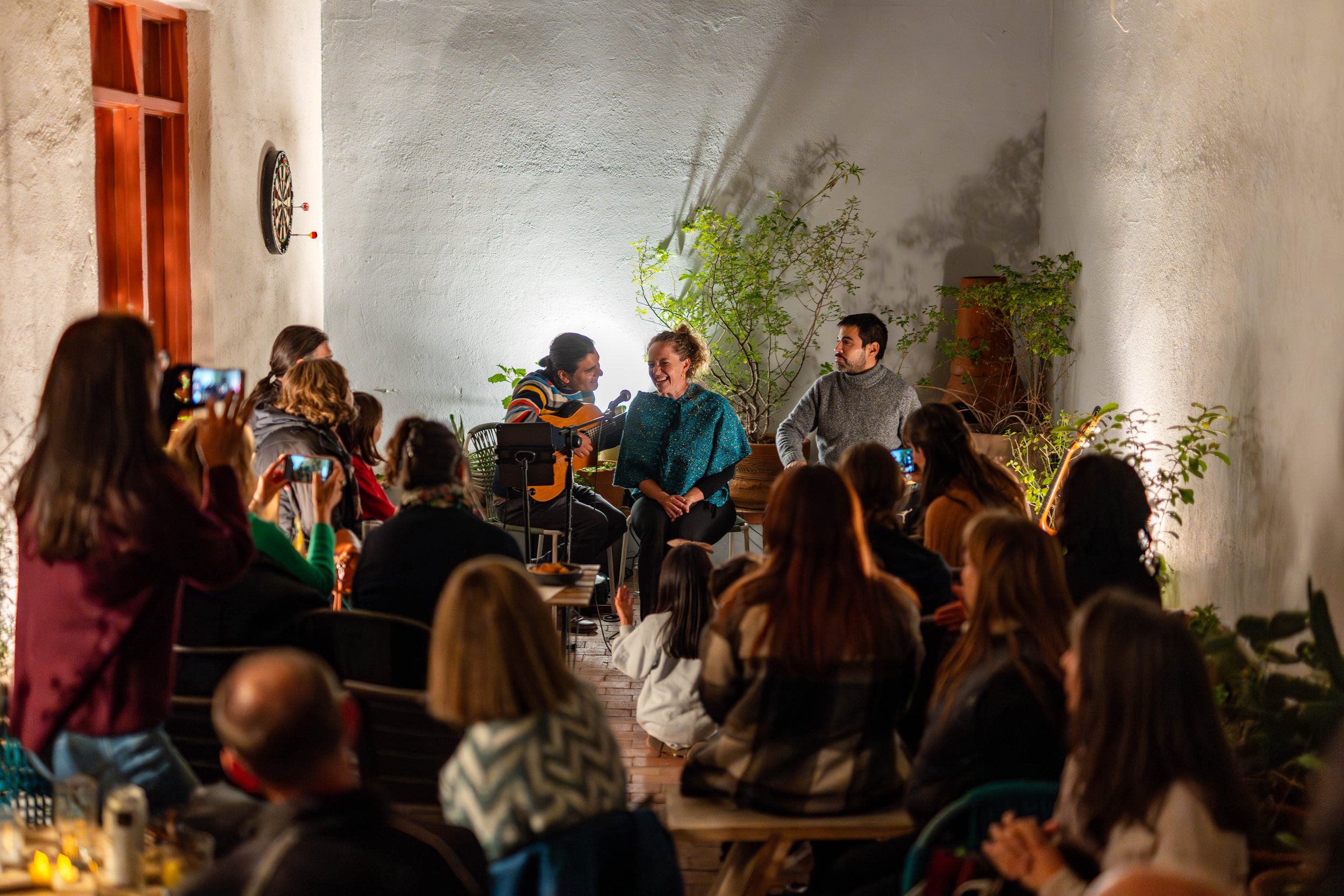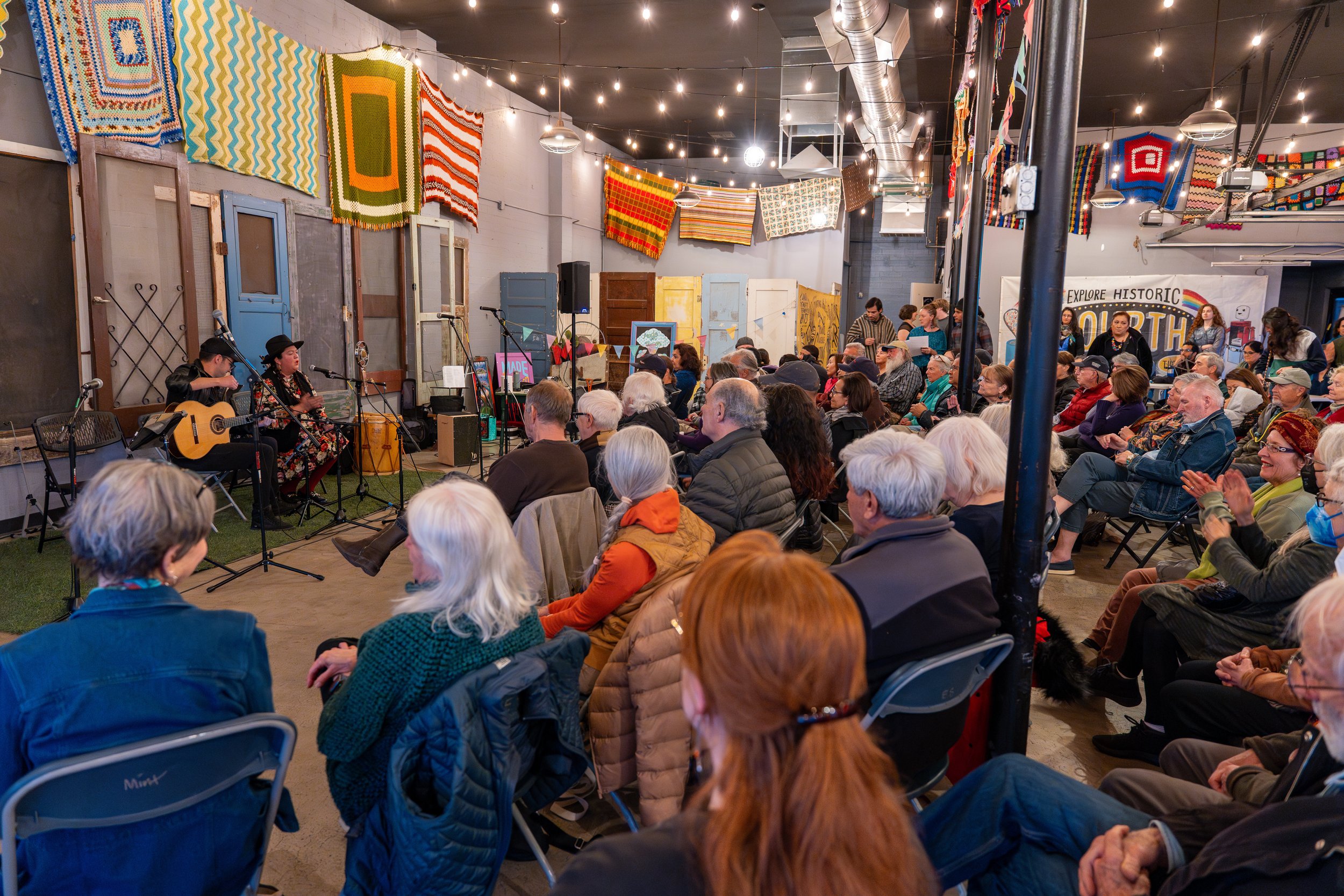La Peña del SurCo is an applied ethnomusicology project led by PhD ethnomusicologist and intercultural arts and health scholar Dr. Jennie Gubner and her Argentine/Chilean folk music group El SurCo (Maxi Larrea, Andrés Pantoja & Diana Peralta). Gubner’s research explores how Latin American models of cultural organizing and participatory music making can be leveraged to promote forms of intergenerational wellbeing and diasporic belonging. .
Project Background and Research Context
Prior to living in Tucson, Gubner spent years in Buenos Aires, Argentina, researching and performing in informal and participatory tango and folk music scenes. During that time she used visual and experiential forms of ethnography to study the social aesthetics of these scenes as spaces of urban belonging and activism and produced a series of short films that allowed her to share her research with diverse public audiences including local artists.
In 2020, Gubner and Larrea moved to Tucson when she joined the faculty of the University of Arizona as an Assistant Professor of Music and Chair of an innovative new Graduate Interdisciplinary Program in Applied Intercultural Arts Research. One of the primary goals of this program is to promote training in arts-based, public-facing, collaborative and community-engaged research, and to reimagine applied arts programming as a platform for public scholarship. Having recently finished a fellowship about Equity in Brain Health at the Global Brain Health Institute and a year researching music and dementia caregiving at the UCSF Division of Geriatrics and Palliative Care, Gubner was motivated to build new public-facing research projects to promote conversations about creative aging within Hispanic communities in Tucson. Her first project, designed during the pandemic, was a house-calls serenata program that trained university students to deliver personalized serenades to home-bound Hispanic older adults in collaboration with the Pima Council on Aging home health services programs.
Emerging from the COVID-19 pandemic, Gubner and Larrea longed for the informal and social music-making spaces that had brought them together in Buenos Aires. Having formed the Argentine/Chilean folk music group El SurCo with Chilean guitarist Andres Pantoja, they would often gather with his family to sing and nostalgically share stories about participatory music making practices from opposite sides of the Andes. Connecting her personal and professional worlds, she began imagining how she might draw on her previous research and collaborate with her band to build a peña as an intergenerational space of musical, social and cultural belonging in Tucson for other Latin American immigrants, Hispanic community members, and others interested in Latin American folk music in their community. In particular, she was eager to use her training as an ethnomusicologist to think about how specific participatory music styles and cultural organizing practices could be used to promote social connection and wellbeing in response to what the US Surgeon General in 2023 declared the country’s Epidemic of Loneliness and Social Isolation.
Inspired by Chilean artist Nano Stern’s visit to the the UA Center for Latin American Studies in October 2023 where he performed and screened his new film about the Nueva Canción movement, Gubner began working with her band and her research assistant Sydney Streightiff to bring their vision to life. The first peña was held December 7th, 2023. Without trying to artificially recreate any specific setting or scene, Gubner instead began piecing together elements from her prior research experiences with her understandings of the lived experiences of some of the South American artists she most admires including Violeta Parra, Victor Jara, and Mercedes Sosa and used this bricolage to set the foundational values and social aesthetics of this emerging project in the cultural context of their new borderlands desert home. As with any music scene, the form of La Peña del SurCo is not static but dynamic, constantly evolving with input from performers and audience members that contribute to our growing community.
Gubner has infused her research background into every element of the peña. First, she worked diligently with her assistant Sydney to identify locations that would have social aesthetics that were financially sustainable and that they felt would feel welcoming to artists and audience members of different ages and backgrounds from across Tuscon. In line with the recent Age-Friendly Designation at the University of Arizona, part of their criteria for evaluating venues involved finding a space that would be welcoming and accessible to participants from 1-101 (as the designation indicates). As part of this effort, they built family-friendly elements into the peña to make parents and children welcome (offering a drawing and sticker station and a venue with outside space to play), and reminding parents that young people are a desired part of this community. Musically, she drew on previous research experiences to design models of participation that would both allow for professional artists and amateurs to share the stage in ways that would be meaningful to performers and audience members. She also worked with artists to design a financial model that offered payment to featured bands to honor their artistic labor. As an ongoing project, all of these elements are regularly evaluated through formal and informal channels.
Continuing her dedication to applied and public scholarship, La Peña del SurCo and this website offer channels through which Gubner seeks to produce and share research in ways that can be accessible and meaningful to the communities she feels privileged to belong to. Above is a teaser for the ongoing film project Gubner and her research lab are working on that again uses visual ethnography to explore the social aesthetics of intergenerational wellbeing and cultural belonging at La Peña del SurCo.
See the KGUN 9 News Story about La Peña del SurCo (October 4, 2024) by Tina Giuliano
Project Timeline & Funding: Using funds from the University of Arizona Health Sciences Stretegic Initiative in Healthy Aging, we held the first Peña del SurCo at Bar Crisol in December of 2023. Quickly outgrowing the space we moved for a few months to the 17th Street Music Club. When we outgrew this space again we moved the project to the 4th Avenue Coalition Space, where we have been ever since. We have held 16 peñas from December 2023 through May 2025, drawing up to 200 guests per month. Our goal is to host peñas throughout the academic year from August-May. In its first year, we were sponsored though a seed grant from the UAHS Innovations in Healthy Aging Strategic Initiative at the University of Arizona. Since then, we have found funding from a variety of university and community sources. We are grateful for all the support we receive and also for donations from individuals and organizations who want to support this project (see donations page).
2023/2024 Funding: Innovations in Healthy Aging Strategic Initiative, University of Arizona Health Sciences
2024/2025 Funding: The University of Arizona Center for Latin American Studies, School of Music, College of Fine Arts, Confluence Center, and The Southwest Center.
2025/2026 Funding: The University of Arizona Center for Latin American Studies, Tucson Guitar Society, Banner Hospital, Arts Foundation of Southern Arizona, The University of Arizona Southwest Center
*We are always looking for new forms of funding to sustain these vibrant cultural gatherings*
La Peña del SurCo Project Team
Co-Directors
- Jennie Gubner, PhD ethnomusicologist, violinist, and Assistant Professor of Music and Chair of the Applied Intercultural Arts Research Graduate Interdisciplinary Program at the University of Arizona
- Maxi Larrea - Argentine Folk & Tango Guitarist, Arranger, Composer & Music Educator
Research Assistant
- Sydney Streightiff, MM, and PhD Candidate, Applied Intercultural Arts Research
The House Band, El SurCo
- Jennie Gubner, Maximiliano Larrea, Andrés Pantoja, Esteban Hernandez Parra, Diana Peralta
Sound Engineer
- Jacobo Ramirez
Audiovisual Documentation & Film Editing
- Chris Zatarain, MM and PhD Student, Applied Intercultural Arts Research & Jennie Gubner

Email correspondence from Jennie Gubner to Ted Warmbrand before our first peña in December 2023:
“So the plan is, each Peña will have us play a short set as a trio, then an invited featured guest to play a short set (5-6 songs), then friends or folks we’d like to hear would be invited to share a song by invitation usually in advance. In this case we have you, Rebecca, Andres’ wife Pachi and her mom from Chile as our friend guests so far. So, if Ana Maria comes I’m sure we can make room for her to share a tune as well, especially for performers who may not always be able to come. Although it is a bit of an invention because I’ve never done this before, I’m just trying to build off the memories I have of the successful Peñas I’ve been to in the past. We’ll see how it goes on Friday and then think about how to do things better next time. I have to start somewhere.”
(December 6, 2023)
